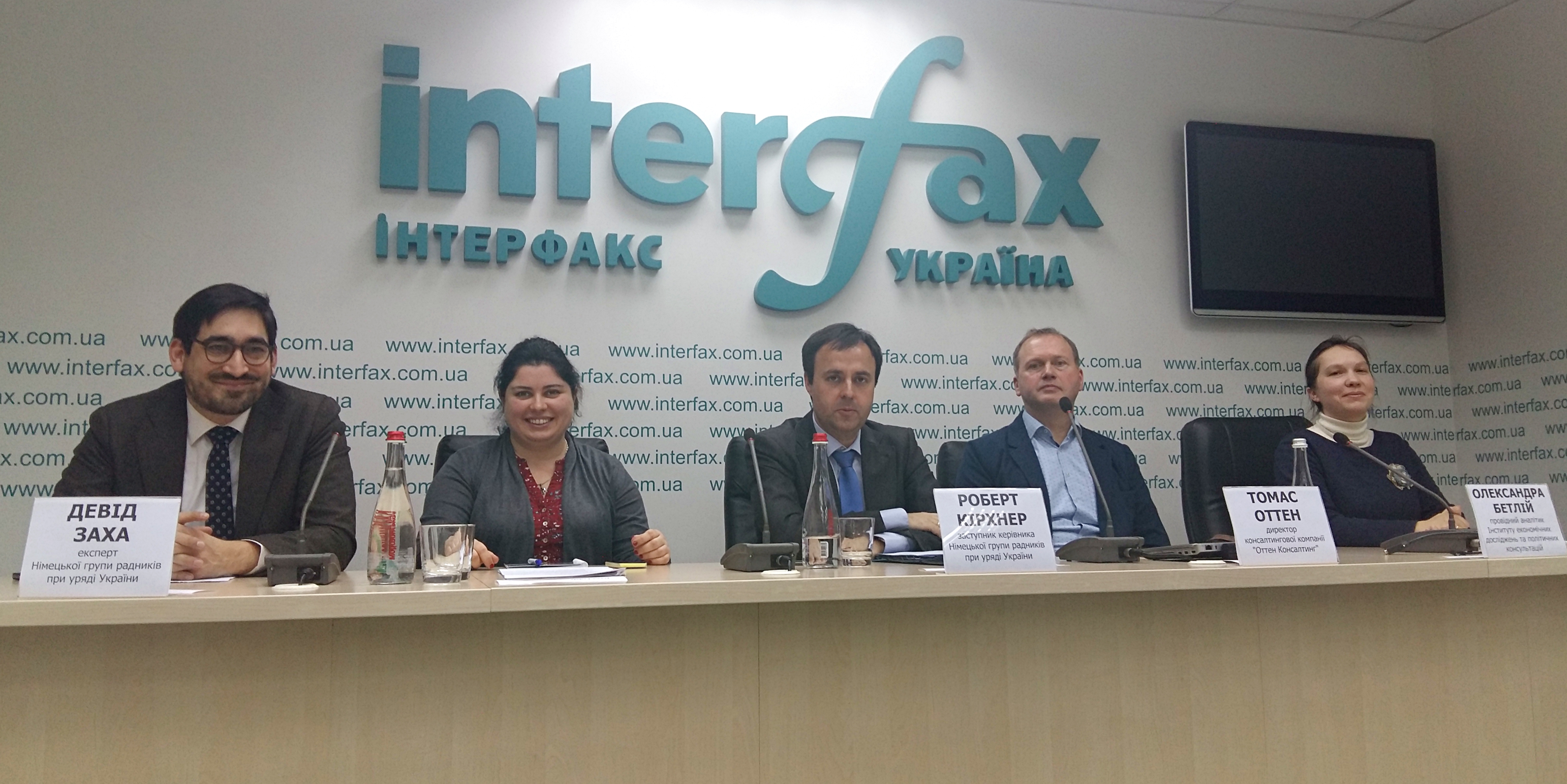The planned introduction of an “Tax on Withdrawn Capital” (TWC) to replace the current Corporate Profit Tax (CPT) would, next to some positive effects, lead to a significant reduction of fiscal revenues in the short term. Solid budget planning and a fundamental reform of tax authorities are required in order for the reform to be a success.
A draft law for introducing the TWC has been approved by the Cabinet of Ministers of Ukraine and is supported by the President. Introduction of the new tax hence appears quite likely. The German Advisory Group in cooperation with the Institute for Economic Research and Policy Consulting and Otten Consulting have analysed the economic effects of introducing the TWC as well as international experience with such taxes. The experts presented their conclusions at the press-conference "How introduction the TWC will affect the Ukrainian budget" which was held in Interfax-Ukraine on the February 1, 2018.
Main results
- The TWC is fundamentally different from the present Corporate Profit Tax (CPT)
The main difference is that the planned TWC is a transaction-based tax on profit distributions to non-payers of the TWC. In contrast, the CPT is based on companies’ annual financial accounts and taxes the financial profit. Another important difference is that retained or reinvested profits of companies would no longer be taxed under the TWC, which supporters of the TWC argue will lead to higher investment and growth. Tax rates under the TWC will be 15% for outright profit distributions and 20% for disguised profit distributions.
- Positive effect on economic growth likely to be limited
The TWC would set some positive incentives for companies to invest. However, only limited effects on growth should be expected. The tax system in Ukraine is not seen by companies as a major impediment to investment. Current CPT rates are normal in international comparison. Accelerated depreciation rules, introduced in 2017 and set to expire in 2019, allow immediately deducting a large share of investments already under the present CPT system and could be prolonged.
- Improvement of business climate possible through simplification of tax administration
The transaction-based TWC should be easier to administer than the CPT. Even tax audits, a major source of worries for companies at present, could in future be more limited as they would focus on individual transactions only and no longer concern the financial accounts of companies in their entirety. In the medium term, this has the potential to contribute to an improved business climate and hence more investments.
- Tax reform does not replace need for comprehensive reform of tax authorities
A major constraint for investments by companies is the institutional inadequacy of the tax authorities. Corruption and lack of capacity at the State Fiscal Service hold back investment far more than the taxes themselves. To unlock investments and to reap the potential of the TWC for simpler tax administration, a comprehensive reform of the SFS is indispensable.
- Significant fiscal shortfall to be expected in the short run
Introducing the TWC will lead to a fiscal shortfall of between UAH 37 bn to UAH 47 bn (1.2% - 1.5% of GDP) in the first years after TWC introduction. This is due to several reasons: 1) The tax base of the TWC is narrower than that of the CPT. 2) TWC tax rates are on average lower than those under the CPT system. 3) Companies can defer taxes by delaying profit distributions after the TWC is introduced. The expected decline in revenues is in line with the experience of other countries.
- If TWC is introduced, solid budgeting is required
Without compensating measures in the budget, the overall impact of an TWC introduction would be clearly negative. Although fiscal consolidation progressed well, Ukraine’s fiscal situation remains vulnerable. The Government should ensure that possible revenue shortfalls even in worst-case outcomes are properly compensated with expenditure cuts or tax increases.
David Saha, member of the German Advisory Group Ukraine and lead author of the analysis:
“For the introduction of the TWC to be a success, it is necessary that revenue shortfalls due to the TWC are compensated by tax increases or expenditure cuts and that fundamental reform of the SFS is continued with redoubled effort.”
Oleksandra Betliy, Leading Research Fellow at IER Kyiv:
“Our analysis shows that introducing the Tax on Withdrawn Capital will lead to a significant reduction of fiscal revenues from corporate taxation. Effects on growth and investment may take place, but will probably be limited and only occur in the medium term.”
German Advisory Group Ukraine: The group advises the Government of Ukraine on economic policy issues since 1994. It is funded by the German Federal Ministry for Economic Affairs and Energy and implemented by the consulting firm Berlin Economics.
Institute for Economic Research and Policy Consulting: Institute for Economic Research and Policy Consulting (IER) is the leading Ukrainian analytical think tank focusing on economic research and policy advice. The IER was founded in October 1999 by top-ranking Ukrainian politicians and the German Advisory Group Ukraine.







